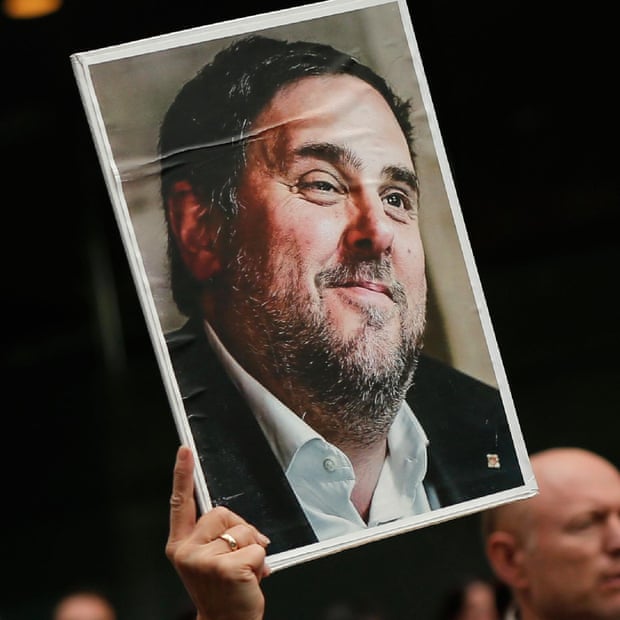Some things are impossible. Catalan independence is currently one of them. The stiff jail sentences handed down to the leaders of the separatist campaign that peaked in 2017 with a banned referendum, police violence and a fudged declaration of independence make that clearer than ever.
There are huge practical obstacles to independence, starting with the many hurdles written into Spain’s constitution. Overcoming these requires massive support in Catalonia itself; but the separatist leaders who orchestrated a head-on collision with the law never had anything like that. The jail sentences are for sedition, but their real problem is hubris.
That was already obvious on the streets of Barcelona and elsewhere when a unilateral proclamation of independence in the Catalan parliament on 27 October 2017 changed exactly nothing. It was, indeed, the day that an otherwise peaceful and often remarkable separatist campaign derailed itself.
A decision by the separatist Catalan president, Carles Puigdemont, to flee the country only served to underline that. Now living in Belgium, he was not among those sentenced on Monday, though an international arrest warrant has now been issued.
The independence campaign embraced the tactics of civil disobedience, where people who deliberately flout the law know they may go to jail. This is often a key part of the process, since it provokes the outrage that brings change. The nine men and women sentenced to between nine and 13 years of prison have stuck honourably to that tradition. Puigdemont clearly has not.
Those now in jail will be hailed as martyrs to their cause and become an inspiration for future generations of separatists. In court, they were unrepentant. “I would do it all again,” said Jordi Cuixart, who received a nine-year sentence. As protesters reacted to the sentences by blockading Barcelona’s airport, it was not clear whether calls to avoid violence would be respected. After the events of 2017, the police response will be watched closely.
Yet the fury felt today by Catalan separatists is not shared in the rest of Spain, nor, more crucially, does it extend very far in the rest of Europe – where they had hoped to provoke a sudden flowering of sympathy. Their campaign, in other words, has failed. The only visible result is a divided Catalan society where explicit support for independence remains below 50%.
Q&AWhat do the lengthy Catalan sentences mean?
Show

Despite the long sentences handed down by the supreme court on 14 October, some of the nine leaders convicted of sedition and misuse of public funds could soon be eligible to apply for “semi-liberty”, allowing them out of prison on a regular basis.
Josep María Tamarit, a professor of criminal law at the Open University of Catalonia, said that in cases where a sentence of five years or more was handed out, a court could stipulate “that half the sentence has to be served before prisoners are eligible for semi-liberty”.
However, the supreme court turned down prosecutors’ request for such an order in the Catalan case.
That means that Jordi Sànchez and Jordi Cuixart – who have now served two years in pre-trial detention – could apply to be allowed out on licence as soon as they have served a quarter of their sentences, which would be in January next year.
Oriol Junqueras, who received the longest sentence – 13 years – would have to wait about 15 months before applying.
Those convicted can complain to Spain’s constitutional court and then put their case before the European court of human rights in Strasbourg.
The Spanish government has the power to issue pardons if they are requested and if the person convicted shows repentance for their crime. However, such a move would have profound political consequences.
Opponents of Spain’s acting prime minister, the socialist leader Pedro Sánchez, would accused him of bowing before the separatists were his government to even consider a pardon. Sam Jones
It could all have ended very differently. Separatists do best when, like the Brexiters who they sometimes resemble, they can claim to be victims of the status quo. In that sense, the police charges during the banned referendum of 1 October 2017 were a gift. The sight of helmeted, baton-wielding officers beating up peaceful voters played directly into their hands. The Spanish state looked, and behaved, like an ogre.
Separatism could have built on that. Instead, it threw its moral advantage away with the independence declaration.
The court sentences concentrate on the referendum and are harsher than expected, and some will argue about the definition of “sedition”, but there is no doubt that the law was deliberately broken. The Catalan parliament does not have the power to declare independence. Nor can it unilaterally call a binding referendum on the subject. In that sense, it is no different to, say, the Scottish parliament. When politicians break the law and cross lines set by the constitution, the courts tell them so. Just as Boris Johnson cannot arbitrarily suspend the Westminster parliament, so Puigdemont could not hold a referendum. And unlike Johnson (so far), his government ignored court rulings – and went ahead with the vote anyway.
Declaring independence ramped up the level of defiance. It was also dishonest, since it was based on a referendum in which only one side campaigned. “Remain in Spain” voters mostly boycotted the illegal vote and, inevitably, the “leave” side won. That is not a solid basis on which to announce an epoch-defining, existential change to the lives of all 7.6 million Catalans.

Spanish rightwingers are today gloating over the court’s sentencing. Yet they are part of the problem. The anti-Catalan rhetoric that has accompanied their periods in power has only served to boost separatism. And even the socialist left, which talks up the idea of a “pluri-national” Spain, has done little to make Spaniards in other parts of the country proud of the languages and cultures that coexist within it.
Paradoxically, an obvious solution is to hold a proper referendum. This would force Catalan voters to face reality. Just the idea of being expelled from the EU would probably be enough to secure a resounding victory for remain. So why won’t Spain do that? The country’s written constitution makes both a referendum and independence theoretically possible, in a process controlled from Madrid. In practical terms, however, it hands a blocking vote to 40% of the senate. Even when the left is in government, the right normally commands that. It will never permit a separate Catalonia.
Since independence is possible in theory, but currently impossible in practice, some separatists may conclude that only violence will achieve their aims. Police last month arrested a group that was allegedly planning to mark this decision with bomb attacks. That is the worst mistake separatists could make. At the first sight of bloodshed, support would likely shrink so far that their cause could take decades to recover.
Their only hope is to keep following the advice of the jailed regional MP and ex-president of the grassroots Catalan National Assembly, Jordi Sànchez. “Let’s express ourselves without fear and move forward, nonviolently, towards freedom,” he said. That is a very long journey.

